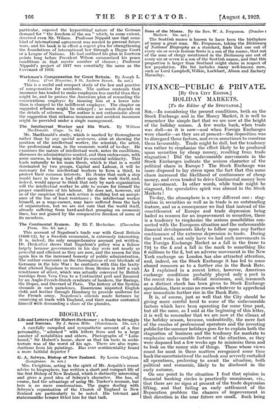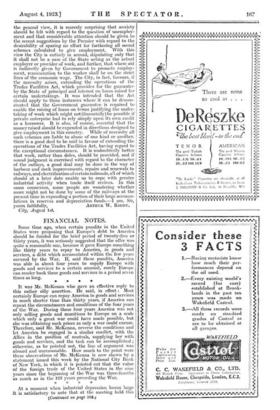FINANCE-PUBLIC & PRIVATE.
[By OUR. CITY EDITOR.]
HOLIDAY MARKETS.
[To the Editor of the SPECTATOR.] SIE,—In considering the present conditions, both on the Stock Exchange and in the Money Market, it is well to remember the simple fact that we are now at the height of the holiday season. A few weeks back, when trade was dull—as it is now—and when Foreign Exchanges were chaotic—as they are at present—the disposition was to disregard those factors, and even sometimes to construe them favourably. Trade might be dull, but the tendency was rather to emphasize the effect likely to be produced upon securities by cheap money, resulting from trade stagnation ! Did the unfavourable movements in the Stock Exchanges indicate the serious character of the political chaos in Europe ? The Stock Exchange was more disposed to lay stress upon the fact that this same chaos increased the likelihood of continuance of cheap money, and even tended to drive Continental money here for investment. In other words, while trade might be stagnant, the speculative spirit was abroad in the Stock Markets !
To-day, the atmosphere is a very different one : -stag- nation in securities as well as in trade is an outstanding feature, and as a consequence we find that instead of the unsettlement of Europe and trade depression being hailed as reasons for an improvement in securities, there is a tendency to emphasize the serious possibilities con- nected with the European situation and the unfavourable financial developments likely to follow upon any further continuance of the extreme depression in trade. During the past week, not only have we had such movements in the Foreign Exchange Market as a fall in the franc to 79i- to the £ and a fall in the mark to something like 6 millions to the £, but an adverse movement in the New York exchange on London has also attracted attention, and, indeed, on the Stock Exchange it has led to some absurd rumours as to a further rise in the Bank Rate. As I explained in a recent letter, however, American exchange conditions probably played only a part in the recent rise in the official .minimum, and, inasmuch as a distinct check has been given to Stock Exchange speculation, there seems no reason whatever to apprehend any immediate further rise in the Bank Rate. It is, of course, just as well that the City should be giving more careful heed to some of the unfavourable factors which have been operating for some time past, but all the same, as I said at the beginning of this letter, it is well to remember that we are now at the climax of the holiday season, because, undoubtedly, the mere fact of the exodus of professional operators and the investing public for the summer holidays goes far to explain both the stagnation of business and the tendency for markets to emphasize unfavourable factors of the situation, as they were disposed but a few weeks ago to minimize them and to look on the sunny side of things. Those whose views count for most in these matters recognized some time back the uncertainties of the outlook and severely curtailed all operations, preferring to await the situation, both political and economic, likely to be disclosed in the early autumn. On one point in the situation I find that opinion in financial banking circles is practically unanimous, viz., that there are no signs at present of the trade depression lifting, and that failing an early settlement of the Reparation problem the chances of improvement in that direction in the near future are small. Such being the general view, it is scarcely surprising that anxiety should be felt with regard to the question of unemploy- ment and that considerable attention should be given to the recent suggestions by the Premier with regard to the desirability of sparing no effort for furthering all sound schemes calculated to give employment. With this view the City is entirely in accord, stipulating only that it shall not be a case of the State acting as the actual employer or provider of work, and further, that where aid is indirectly given by Government to promote employ- ment, remuneration to the worker shall be on the strict lines of the economic wage. The City, in fact, favours, if the necessity arises, extending the operations of the Trades Facilities Act, which provides for the guarantee by the State of principal and interest on loans raised for certain undertakings. It was intended that the Act should apply to those instances where it can be demon- strated that the Government guarantee is required to enable the raising of loans on terms justifying the under- taking of work which might not (financially) be possible if private enterprise had to rely simply upon its own credit as a borrower. It is also, of course, essential that the money raised should be expended in directions designed to give employment in this country. While of necessity all such schemes are liable to abuse of one kind or another, there is a good deal to be said in favour of extending the operations of the Trades Facilities Act, having regard to the exceptional circumstances. It is undoubtedly better that work, rather than doles, should be provided, and if sound judgment is exercised with regard to the character of the outlays, a good deal may be done in the way of harbour and dock improvements, repairs and renewals to railways, and electrification of certain railroads, all of which should at a later date enable us to cope with greater industrial activity when trade itself revives. In_ this same connexion, some people are wondering whether more might not be done by some of the railways at the present time in expending a portion of their large accumu- lations in reserves and depreciation funds.—I am, Sir,
City, August 1st.



































 Previous page
Previous page